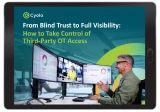One of the most persistent and overlooked threats in the manufacturing industry is shadow remote access. Shadow remote access often arises for the most innocent of reasons – employees and third-party vendors simply want to get their work done. When approved processes and tools are too complicated or cumbersome to work with, they turn to unauthorized means of entry.
Unfortunately, unauthorized access – no matter how well-intentioned – can lead to significant operational disruptions, financial losses, and even safety hazards. Understanding why shadow remote access occurs, the risks it carries, and how to enable workers to complete their tasks without resorting to shadow remote access is crucial for protecting manufacturing and other industrial environments.
Why Workers Turn to Shadow Remote Access
Shadow remote access refers to unauthorized remote connections that bypass official IT and security protocols. Several factors contribute to its prevalence:
Convenience and Productivity: Employees and third-party vendors may turn to unauthorized remote access tools to quickly troubleshoot or maintain systems, evading more cumbersome official channels.
Complex Processes and Protocols: The formal remote access protocols in OT environments are often complicated and time-consuming. This can lead to frustration and cause workers to seek out quicker – albeit unauthorized ways – ways to get their jobs done.
Legacy Systems: Many OT environments rely on outdated legacy systems that cannot accommodate modern security or identity authentication protocols. This can make it difficult if not impossible to connect to such systems in a manner that adheres to security best practices.
Enforcing Third-Party Compliance: Third-party vendors, technicians, and original equipment manufacturers (OEMs) play an important role in keeping manufacturing operations running smoothly. However, these external users typically work on their own devices, and requiring them to install specific agents (like a VPN) can result in conflicts with their own organizational policies.
Emergency Situations: In an emergency, the need for rapid support and maintenance of critical assets often clashes with official policies and lengthy protocols for ensuring secure access. Keeping systems operating safely will always be the top priority in manufacturing, even if it means bypassing IT procedures.
Lack of Awareness: Cybersecurity is still a new phenomenon in the world of OT, and personnel may lack awareness or proper training. This can result in mistakes and unintentional security breaches even among well-intentioned workers.
The Risks of Shadow Remote Access
The risks associated with shadow remote access are multifaceted and can have severe implications:
Operational Disruptions: Unauthorized access can lead to system malfunctions or shutdowns, causing significant production delays and financial losses.
Data Breaches: Sensitive information, including proprietary manufacturing processes and customer data, can be stolen or compromised.
Safety Hazards: Manipulation of industrial control systems can result in dangerous situations, risking the safety of workers and the wider public.
Compliance Violations: Unauthorized access can lead to non-compliance with industry regulations, resulting in legal penalties, financial damages, and loss of customer trust.
How to Overcome the Lure of Shadow Remote Access
As we have seen, shadow remote access is often not malicious in nature but rather the result of workers wanting to do their jobs effectively. Still, the consequences can be very serious, and mitigating the risks of shadow remote access therefore requires a comprehensive approach:
Upgrade to Modern Remote Access Solutions: In the past, manufacturers and other industrial organizations had little choice but to rely on security tools designed for IT. These tools likely did not consider the realities of the OT environment. Fortunately, using IT security tools is no longer the only option. The most significant step organizations can take is to upgrade to modern secure remote access solutions that are purpose-built for OT and meet manufacturers’ specific needs. Beyond their security functionality, these solutions should be user-friendly to prevent employees and third parties from seeking out unauthorized shortcuts. When migrating to a new solution, make sure old gateways are closed.
Adopt Zero-Trust Architecture: Implement a zero-trust security model that verifies every access request regardless of its origin within the network and assign access permissions according to the principle of least privilege.
Emphasize Employee Collaboration: Work with employees rather than against them. Engage them in understanding the importance of following secure access protocols and the risks associated with shadow practices.
Awareness and Training: Regularly conduct training exercises to improve awareness about the dangers of unauthorized access and the importance of adhering to established security measures.
Conclusion
Shadow remote access in OT, particularly in the manufacturing sector, poses significant cybersecurity challenges. Addressing these challenges requires not just technological solutions but also the fostering of a culture of cybersecurity awareness. By taking proactive measures and working collaboratively with employees, manufacturers can protect their operations, data, and personnel from the risks associated with unauthorized remote access.
And there’s no need to embark on this journey without some help. Cyolo offers an agentless remote access solution, designed to simplify the connection process, increase operational agility, and reduce expenses. This modern solution is built to meet the specific needs of OT environments, ensuring secure and efficient remote access without the complexities and conflicts associated with legacy systems.
Learn more about Cyolo's unique approach to secure remote access or schedule a personalized demo to see the platform in action.

Shir Basok
Author
Shir Basok is a Product Marketing Manager at Cyolo, where she transforms deep technical expertise in secure remote access and OT security into stories that drive awareness and action. She’s passionate about simplifying cybersecurity and helping organizations protect what matters most — their operations.

Subscribe to Our Newsletter







